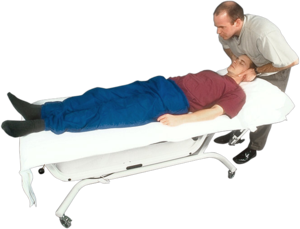Can a Pain in the Neck Raise Your Blood Pressure?

A chance discovery at the University of Leeds in the United Kingdom may give credence to longstanding claims by chiropractors that treating pain and stiffness by adjusting the neck can also lower blood pressure.
In a study published in the Journal of Neuroscience Jim Deuchars and his team report finding connections between rats’ neck muscles and a specific region of the brain. Their findings indicate that the neck muscles could play a key role in controlling blood pressure, heart rate and respiration.
They found that nerves run from receptors in the neck muscles to a region in the brainstem called the nucleus tractus solitarius that is known to be involved in the control of autonomic nervous system. It seems likely that signals from the neck could play a key role in ensuring an adequate supply of blood to the brain as we change position, for instance standing up suddenly. If the signaling system fails we may run into problems with low blood pressure (postural hypotension) and difficulties with balance.
Although it is early days, and it is a long way from a rat study to understanding human physiology, the finding may do more than provide a tentative explanation for the chiropractic reports. It may also explain another puzzle: why some people with whiplash injuries get trouble with their blood pressure. On the other hand, there have been a number of studies that have shown that the practice of yoga may help control blood pressure. It had been assumed that it was simply a consequence of generalized relaxation, but perhaps it is more specific than that: could a soft flexible neck be important in maintaining a healthy blood pressure?
The best research studies are the ones that suggest more questions than answers: on that criterion this is a most important study.






